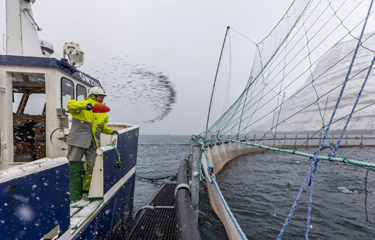Faroe Islands-headquartered Bakkafrost Group saw decreased earnings before interest and taxes (EBIT) in the fourth quarter, due in large part to the depressed global market for salmon.
Bakkafrost Group delivered total operational earnings before interest and taxes (EBIT) of DKK 88.5 million (USD 14.5 million, EUR 11.9 million) in the fourth quarter of 2020, down from DKK 415.3 million (USD 67.9 million, EUR 55.8 million) in the corresponding period of 2019, with large volumes and reduced demand contributing to the downturn.
The group recorded a loss in the last quarter of DKK 37.7 million (USD 6.2 million, EUR 5.1 million), reversing a profit of DKK 219.5 million (USD 35.9 million, EUR 29.5 million) in Q4 2019.
For the full-year 2020, the Atlantic salmon producer achieved an operational EBIT of DKK 621.2 million (USD 101.5 million, EUR 83.5 million), down from DKK 1.3 billion (USD 212.4 million, EUR 174.8 million) in 2019. The company’s annual profit fell from DKK 801.9 million (USD 131 million, EUR 107.8 million) to DKK 462.8 million (USD 75.6 million, EUR 62.2 million).
Bakkafrost CEO Regin Jacobsen said Q4 was another quarter marred by the COVID-19 pandemic, which has depressed the global market for salmon.
“The negative effects of the pandemic on the salmon market continued during this quarter, when many countries experienced their second wave of COVID-19. This has been challenging to our customers as well as to intercontinental logistics. Especially the foodservice sector has been depressed while retail has developed strongly,” Jacobsen said. “Again, during this quarter, we have benefited from our flexible value chain and diverted larger harvest volumes into our VAP segment, producing high-quality retail products. Despite the challenges caused by the COVID-19 pandemic, we have been able to maintain a high production during the whole of 2020, including Q4. Under such challenging market conditions, it is also positive that the industry – including Bakkafrost – has demonstrated financial resilience.”
In total, the group harvested 25,262 metric tons (MT) of salmon (gutted weight) in the last quarter, comprising 15,957 MT that was harvested in the Faroe Islands and 9,305 MT from Scotland. For 2020 as a whole, Bakkafrost harvested 85,686 MT of salmon (up from 65,109 MT in 2019), with 50,700 MT from the Faroes and Scotland’s contribution amounting to 34,986 MT.
Bakkafrost has forecast a 2021 harvest of 106,000 MT gutted weight, with 66,000 MT coming from the Faroe Islands and 40,000 MT from Scotland. It also expects to release around 14.5 million smolts in the Faroe Islands this year, compared to 14.3 million smolts in 2020, 12.7 million smolts in 2019 and 12.6 million smolts in 2018. The release in Scotland is expected to be 11 million smolts in 2021, compared to 10.4 million smolts in 2020, 12.4 million smolts in 2019 and 8.6 million smolts in 2018.
Jacobsen said the Faroes’ farming operations had been strong in Q4 2020, with the implementation of the group’s large-smolt strategy progressing above expectation.
“We are pleased to have announced our expected harvest volume target from 2021 which shows that our large investments past years are now beginning to materialise in growth as well as biological risk reduction,” he said. “In Scotland, the farming operation has been challenging in this quarter and during second half of the year. Historically, this has been a recurring pattern which we expect to be able to relieve going forward. We have learnt a lot during 2020 and have already made many improvements in the farming operation. However, the real game-changer will be when we have implemented our large-smolt strategy in Scotland.”
Details of this strategy will be shared at Bakkafrost’s Capital Markets Day in September, Jacobsen said.
“All in all, the global salmon market – measured in volume – has grown during the fourth quarter. The growth has been especially strong in the U.S. and E.U. We are hopeful about this development as this could contribute to a stronger market with even more consumers having an appetite for salmon, once the pandemic is behind us. With the vaccination progress that is being made in many countries, we expect that the salmon market will improve significantly during 2021,” Jacobsen said.
According to the Q4 report, Bakkafrost’s Faroese farming segment achieved an operational EBIT of DKK 62.5 million (USD 10.2 million, EUR 8.4 million) in the three-month period, down from DKK 338.3 million (USD 55.3 million, EUR 45.5 million) in Q4 2019, which corresponded to DKK 3.92 (USD 0.64, EUR 0.53) per kilogram. For 2020, the farming segment’s operational EBIT was DKK 447.8 million, down from DKK 1.1 billion (USD 179.7 million, EUR 147.9 million).
Its Scottish farming segment recorded an operational EBIT loss of DKK 54.1 million (USD 8.8 million, EUR 7.3 million) in Q4, and DKK 24 million (USD 3.9 million, EUR 3.2 million) for the year overall.
The VAP (value-added product) segment posted an operational EBIT of DKK 80 million (USD 13.1 million, EUR 10.8 million) for the last quarter, up from DKK 36.6 million (USD 6 million, EUR 4.9 million). At the same time, the company’s fishmeal, oil, and feed (FOF) unit delivered reduced earnings before interest, taxes, depreciation, and amortization (EBITDA) of DKK 48.1 million (USD 7.9 million, EUR 6.5 million).
Bakkafrost expects a decrease in its production volumes of fishmeal and fish oil in 2021, with Havsbrún’s sales of fish feed expected to reach 120,000 MT, depending on external sales.
Photo courtesy of Bakkafrost







